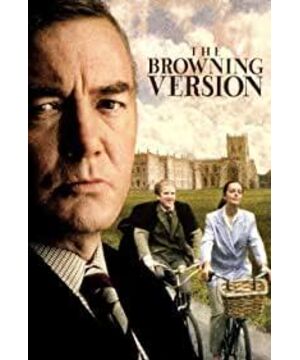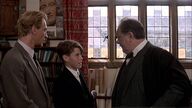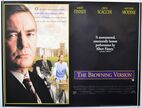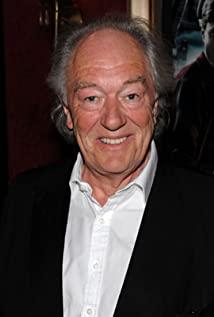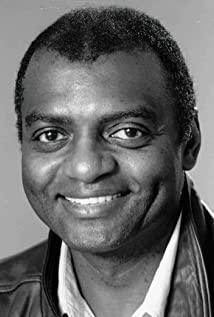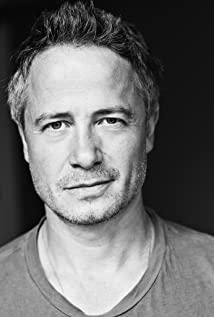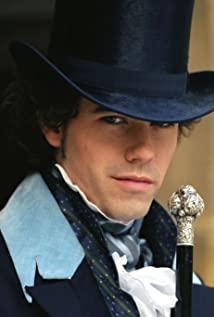"Browning's Translation," the film ends with Professor Harris standing alone under the academy's arches. Just like the beginning of the film, the long shot cuts from the outside to the inside, a story about a "cowardly husband and a dissatisfied wife", or, in other words, a story about sticking to the classics and facing the challenges of the times.
The film's male protagonist is Professor Harris, who, like all typical down-and-out protagonists, is frustrated in both career and love. The theme of the film is slowly unfolded shortly after the opening. Professor Harris is facing a severe "old age crisis". The college he has taught for 18 years will dismiss him. He is about to move away from the home where he has lived for a long time. In essence, this home is also facing disintegration. In the state of separation, his wife secretly flirts with the new young American professor, and intends to divorce him and rebuild a second love nest.
Under the surface of temporarily facing difficulties in the career and love field, there is a deeper "crisis of people's hearts". Professor Harris teaches classical literature, but very few students are interested in it. The students are shocked by his majesty, and privately call him "Hitler at level 10", but they are attracted by the interesting chemistry class upstairs. The teachers and principals who work with him are always reluctant to listen to him finish what he has to say. Even the new teachers want to say hello to him, but they are dragged to the staff dormitory by other teachers. There are also rumors of his wife's affair among the teachers, which is cited as a source of discussion.
All of this constitutes the protagonist's predicament at the beginning of the film, which is finally relieved at the end of the film, as Professor Harris draws an arc from stubbornly sticking to tradition to striking a balance between sticking to tradition and responding to the times. Perhaps it was Browning's translation of Agamemnon, donated by his student Taplow, that propelled Professor Harris' conversion. Professor Harris once loved and translated "Agamemnon" when he was young. Although it was not published, he thought it was a better translation than the original. This youthful passion was eventually worn down and turned into an old pedant that everyone in the school kept away from. Just like the vast majority of people, in the first year or two, they were full of passion and did what they said. In the third and fourth year, passion gradually wears down, and in the fifth year, it is mediocre, that is, just messing around. When people are most important, maybe for a year or two, do what you want to do, at least not regret it, or stay if you don’t. The next unstoppable knot. What did Professor Harris want to do when he was young? The film does not discuss it directly. Starting from Taplow's translation of Browning's translation to him, the inner arc of Professor Harris began to start. I think this is the beginning of unraveling the knot. , suppressed youthful passions, anachronistic classical style, unloved by students, inappropriate marriages... One knot, one after another, deeper and deeper into Professor Harris' private life, getting closer and closer to the essence of life One - love. Those things done without heeding the call of the heart (for example, Professor Harris has long known that he and his wife are incompatible, and still barely maintained for decades), after all, they need an opportunity to get over the knot, and they need to find love - whether it is love for things , or love for people. Whether it is the passion for the thing itself that is gradually lost because of regret, or the gradual loss of confidence and enthusiasm for life when it involves life. Maybe we're all missing an attempt to do whatever we want without breaking the rules, and this may be everyone's "Browning's translation" -- the starting point for unraveling the knot.
Untangling the knot is like going through a process of reconciliation with yourself. The end of the film focuses on the reconciliation of the protagonist and himself. Regarding marriage, Professor Harris said to his wife, "We have no right to ask each other to do anything." To the students, he said, "I apologize because you have the right to ask a teacher to do what you have to do, sympathy, encouragement, kindness. The noblest calling of mankind is to care for and guide young people, and I am shameful. When I was in this school, I still believed that my mission was to teach, and I knew what I wanted to do, but I didn’t do it.” For Professor Harris, the courage to face the problems of marriage and the shortcomings of education has shown the Regardless of the detachment of others, at this time, it is no longer Professor Harris who is trapped by the modern approach, but bystanders.
In fact, as far as I am concerned, I believe that Professor Harris's inspiration for students is more profound, and his devout attitude of abiding by classical and deep learning will echo in the hearts of younger students for a long time. Students naturally welcome teachers who can resonate with them, however, it is also a blessing to have met the best reader (Professor Harris). In terms of learning, not everyone has the opportunity to be the best and most complete, but after seeing and knowing that there are such a group of people in the world, they can conversely observe their own incapacity. A small step forward is also a harvest and fulfillment.
Unexpectedly, this movie is one of the few films to be watched in tears. Perhaps having the same heart knot will produce the same resonance. The conflicts throughout the film are not only the frustrations in Professor Harris' life, the adherence to the classics and the impact of modernization, but also the issues that have to be considered and faced in the current educational and even social environment. The "old age crisis" is reflected, and it is also reflected through the confusion and confusion of everyone who lives in it. In retrospect, it is also quite interesting. Although it is a British film, during the viewing process, I often think of Taoism. The arc in the heart of the protagonist, Professor Harris, seems to be a process of gradually becoming "natural", and in the impact of classicism and modernization, the answer given by learning and giving is: the road is not far away.
View more about The Browning Version reviews


